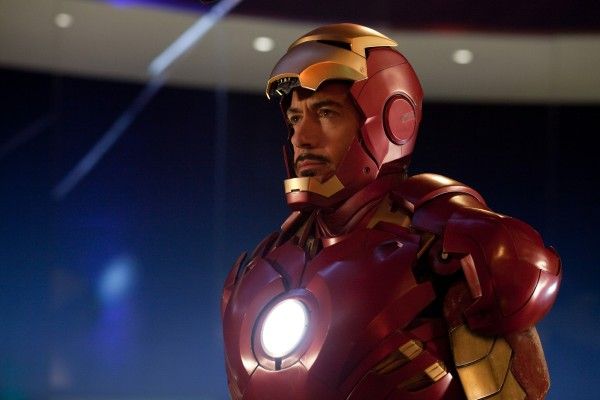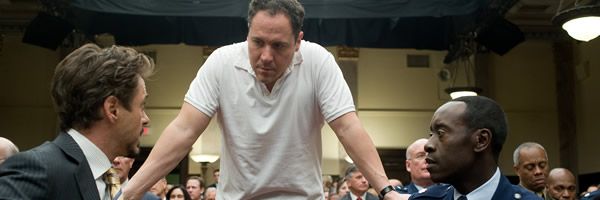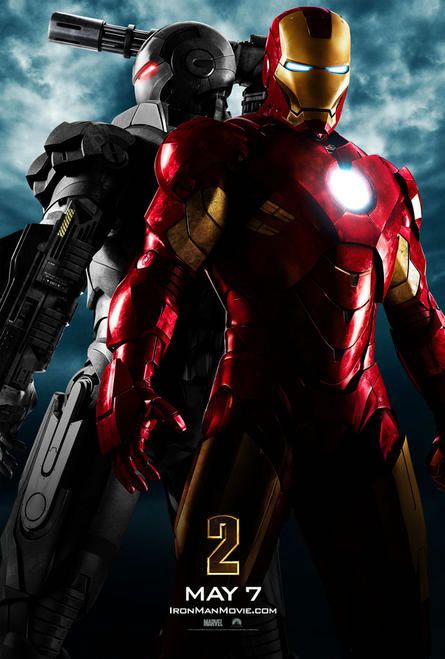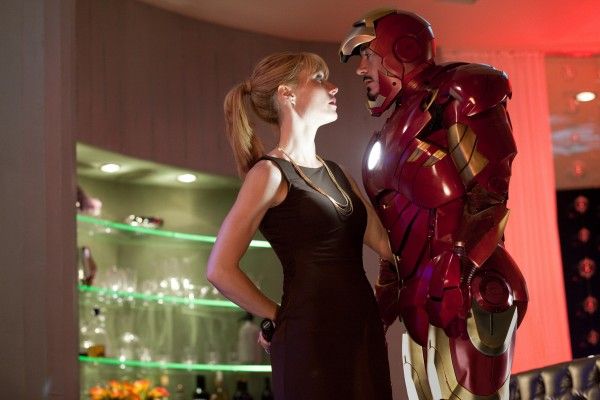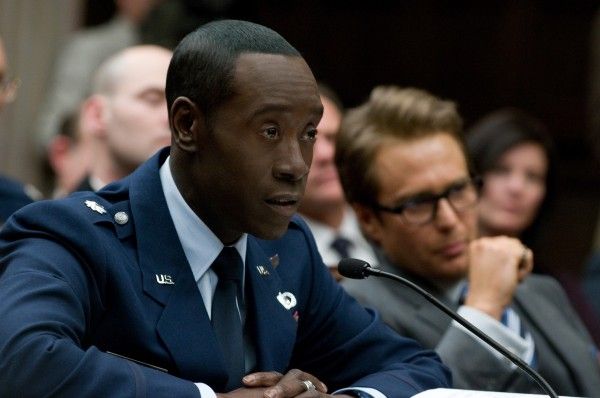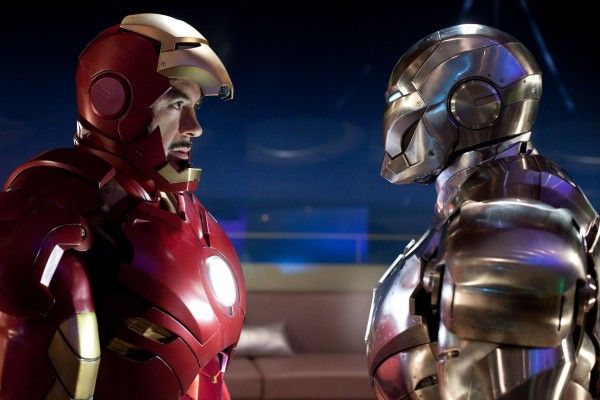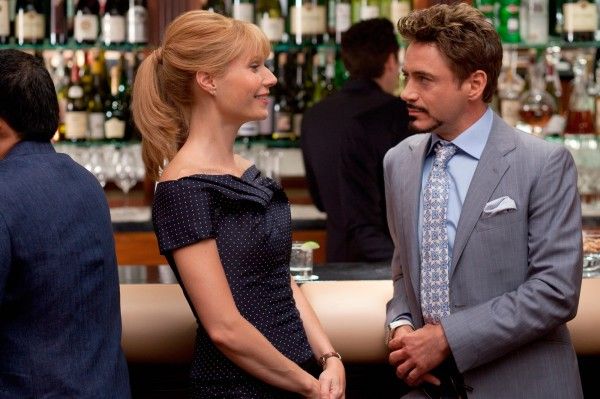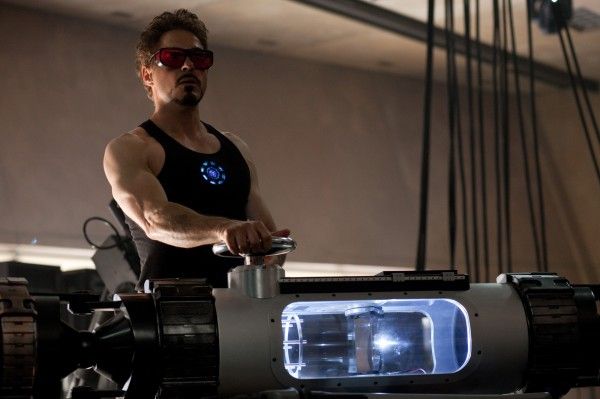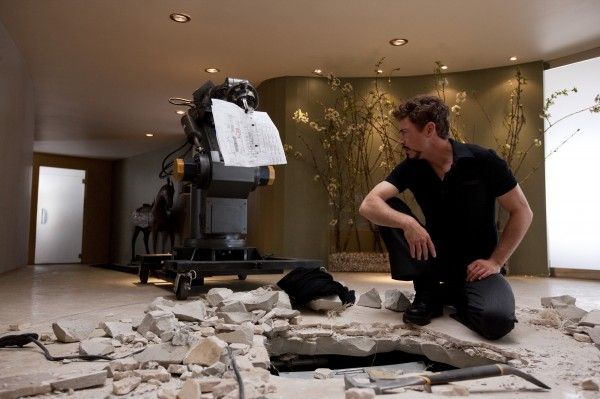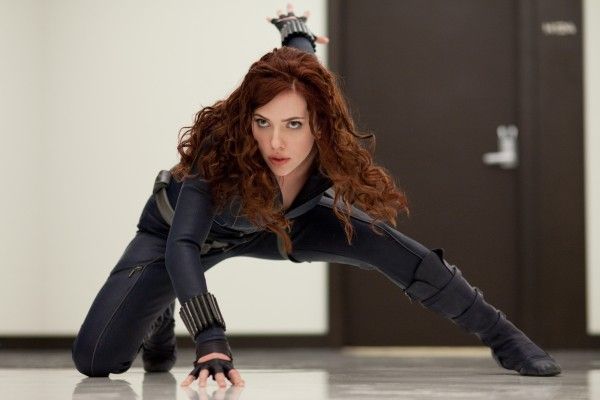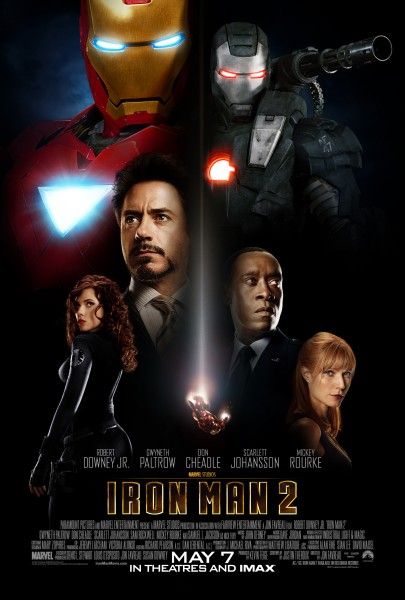Last June, when Iron Man 2 was filming here in Los Angeles, I was invited - along with a few other online journalists - to visit the set. While I was allowed to write about my experiences on set last year, I haven't been able to post any of the interviews until now. But with Iron Man 2 getting ready to be released all around the world, Marvel/Paramount have lifted the embargo and I can share the awesome interview I got to do with Robert Downey Jr. and director Jon Favreau.
While a lot of the info we got on set is now readily available, what's great about the interview is hearing the two of them talk about the movie in the middle of production. Often after a film wraps, all you get are safe and static answers to the same questions. But the people who visited the set with me all asked great fan questions and you'll learn a lot about the movie and what was going on behind the scenes. Of course we also talked about so many other subjects, it would be impossible to summarize it here. Trust me, if you're a fan of the Iron Man franchise, you'll love the interview. Hit the jump to read or listen:
As always, you can either read the massive transcript below or listen to the interview by clicking here. Iron Man 2 gets released in some parts of the world tomorrow and in North America on May 7th.
Finally, when this interview started, it was just Favreau. Downey Jr. came over a few minutes after we started. And if you'd like to read a huge on set interview with Favreau, click here.
--
Note - This interview was conducted on June 3, 2009
Question: So that is tough for him to do the whole thing...(we're talking about acting against nothing - pretending computer screens are all around him).
JON FAVREAU: It is and we're trying to work it in because we're dealing with big holograms, we want to have parallax and perspective shifts so it's all about the moving camera and height differences so it's us understanding and pre-vizing what its' going to be and then getting a special relationship with it then designing moves and also creating interactive light so you see it on his face.
From our perspective.
FAVREAU: And it requires a lot of imagination. There's also sets of commands that he has also that we go through what the rules of that are, so there's sort of lines and elder lines and we're changing the dialogue based on what we've come up with visually.
In the shot we're just going to see all of those visual effects just like right in front of him.
FAVREAU: I mean wire frame and whatnot with different color changes depending...and then we had to create interactive light color changes as well.
Does it make it easier that you can use, you know obviously he gives the eye line, I mean can you work with that a little bit so it makes it a little bit easier.
FAVREAU: A little bit but not much. Yeah, so it's dictated by eye line, by movement, and then there's certain things that are interactive clearly because he touches them and there's certain things that are just gestures and there's little things that we know effects advisor my visual effects supervisor, Janak Serge with me watching the monitor suggesting places where little flicks or flips and then he'll sometimes Robert of course will throw other things in. We'll do that and he'll do it, do this or wham and then we say okay the thing's going to grow to a certain size so then we have to design a techno-crane move and then they're not framing on anything of course of it's very hard for them. They want to always frame on what's in the frame. So it's like no, the thing's going to be here. You're under it now. You're there and what he's pointing to is there so let's move that. So it takes a lot of...not that it's immunable but you have to be specific in what you go for because otherwise it seems very general if you're just doing this all the time it seems weird and the actor loses focus, too.
It's timing really.
FAVREAU: Yeah. You do need spatial memory in relationships and then how far do you get from the interactive light source and what things could be painted out and what not, so there were times you saw the light grid at the bottom but we could paint over that and then we'd have to get clean plates of everything. It's tedious work but from the first film some of the most fun stuff. So what we shot like this on the little tabletop just as an afterthought, it's let's just try this, let's try this and here's a little tennis ball for an eye line. And then him actually putting...he sticks his hand in the gauntlet, that was an afterthought when we were on the set. We said let's do one more take and why don't you pretend to put your hand in and we gave it to our in-house pre-viz team and they came up with the idea that he could actually wear and interact with the thing. And it ended up being...and once it makes the movie it's like forever.
One of the things you talked about earlier is...one of the things I wanted to follow up on is that the world now knows that he is Iron Man.
FAVREAU: Right.
Are you going to have some sort of like fun moments with that in the film?
FAVREAU: The whole movie is based on that. When you have...what's nice is we're not trapped in avoiding or repeating other films with the secret identities. And the tongue-in-cheek reality that that also implies, so we went the other way as actually it was Feige's idea-Kevin's idea-like why doesn't he say it at the press conference. I was like good luck next time because I don't know what you'll do and so it's what do you do with that? What would really happen in you do that? How do your enemies react? How do your friends react? How much attention are you drawing to yourself? You become a big target and fame in general has a good side and a bad side to it. And you become a lightening rod and you get tremendous adulation so you become bigger than life in certain ways and in other ways you become, you know, just like John Lennon. You know what I mean? Who would ever think that that would happen to him based on writing music?
Is he almost living like a paranoid existence now since he's done it?
FAVREAU: Well, he's definitely living under pressure but he's a guy who's not an introvert. Well, you can ask him. Here he is.
[Robert Downey Jr. sits down at the table]
Hi!
ROBERT DOWNEY JR: Hello!
How're you doing man?
DOWNEY: Fine.
So you're now much more comfortable with showing that (his box that he carries around) to people. At the Soloist you started....
DOWNEY: No, I always pull this thing out. Now I have a pelican case inside a pelican case.
Where are you going to sit, sir?
Downey: I hate high chairs.
[One of the journalists motions to an empty chair] Give me that chair. Where do you want that chair?
[Another Journalist remarks] No, that one's still high. You don't want to be here do you?
DOWNEY: This is even better. This is very low maintenance.
FAVREAU: How come you have a coffee and I don't have a coffee?
DOWNEY: Would you like one? What do you think about this?
FAVREAU: I like it. (laughter) We're at Comic-Con.
So I basically asked a second ago that there's...the world now knows that you're Iron Man and that's how you ended the first film.
DOWNEY: Yeah.
Are you going to have some fun moments with that in the sequel?
DOWNEY: Yeah. We have...it's nuts how kind of ....I can't really talk about anything, right?
We signed a Non-Disclosure Agreement, so yeah.
FAVREAU: Yeah, they're running stories closer to...what's the rules here, Jon?
DOWNEY: We can't talk about anything. We're just glad you came and sat around all day. (laughter)
FAVREAU: They're going to hold this stuff until after everything runs...I mean until after Comic-Con piece runs and before the film comes out, so it's going to be closer to release but it's still pre-release press.
We'll have one piece at Comic-Con, right before Comic-Con, and then from the Comic-Con stuff closer to release.
DOWNEY: And we're out of time. Thank you. (laughs) Well, I think that was the big buy last time around and for us our litmus, I think. Mr. Favreau and I is if it seems like movies or super hero movies usually do this, then that was our Alamo of what we didn't want to do. So that, to me, was kind of I think it was kind of a tween or two right? Like we weren't sure if we were going to do that or not.
FAVREAU: It was Kevin's thing and it was "funny ha, ha, ha as an out", and then now we're, I think, probably be inciting action of this whole thing is him revealing that and what does that really mean to a real person, to a real world, and then we heighten it for our super hero reality.
Does this one pick up right after the end of the other one?
FAVREAU: 6 months later.
So do you explore really like the motivation behind why did he say that? Was it just out of ego? Was it out of...?
DOWNEY: Well, as usual half the stuff he does he doesn't ever really know (I love you, Mrs. Downey) doesn't know why he did it. He does it in the moment because it seems appropriate to do or it's counter-intuitive, I think, for Tony Stark to be blatantly dishonest. So, I think if you have an opportunity to tell the truth in a way that's irrevocable you might as well do it when people can't stop you because you're about to do it or you already did it. There's a little problem with authority too because he's told not to, told not to and that seems to be a through line as it speaks to his father issues, too I think.
Can you talk a little bit about what we were just seeing in there?
DOWNEY Yes. Essentially, I mean, there's the whole energy crisis thing and he's having his own energy crisis of sorts as inferred last time. And it's always in these things too whether it's the lifting crystals can't hold out much longer or your RT power is now on 35%. But it was always a spectacular, energetic source but, you know, not a Duracell, more of a Ray-o-Vac and so there's the crisis of energy and there's this legacy of his dad and these expos occurring every decade or so. And it's kind of a...what do you call it? It's a bit of a grail. It's kind of the grail of the movie, isn't it?
FAVREAU: Yeah. Technical innovation that takes everything that he's involved with to the next level because it's still a flawed technology that he's working on, you know? And it's still a life-support system of sorts.
DOWNEY: By the way, last time I'm hanging out with every cutting edge mythology freak and all these science guys, some of whom Jon and I have actually befriended, me more, like the kind of like weirdo writer guys who go do lectures at city colleges and then Jon more like the big business smart no-names and all that. But I said you know palladium is the magical metal. It's the chemical metal. He's like anyway once he keeps saying palladium just let him say it. And then we found out actually that cold fusion, one of these technologies, was based on palladium. And likewise this time around, I've actually just watched that thing that you asked me to...that "Nova" piece, yeah. So the funny thing is we're just a couple of weirdo's and we're interested in science and we're really interested in story and we challenged each other this time around to really make this much more human and base it on a much deeper emotional way so that the other stuff is [inaudible] and it's just like all the movies that I love. The more you get me in a sense of felt-reality than the more excited I am to see how far out things go.
Can you talk about working with Mickey Rourke and sort of the...your character and his character both seem to have kind of daddy issues?
DOWNEY: Right. Yeah, there's a lot of that going around. Well, I also pulled out my....what's the book? The one that you were like "I read that. Please put that away. You're making me tired".
FAVREAU: "Writer's Journey?"
DOWNEY: Yeah, "The Writer's Journey". I pulled out all the old Joseph Campbell stuff and I was like but this point The Nemesis in the Shadows should be with The Trickster and The Hall of the Inner Sanctum, and he's like "I know. I know. I know. I read that book like 40 times". Like but did you read page 38?
FAVREAU: It's a good book. It's a good book for this, too.
DOWNEY: Very, very good. And as we introduce new characters part of how we try to make it not be just be a big primordial stew of people, it's to differentiate through archetypes and stick to those rules. That actually is the tough part and we realized it just a little bit last time of how many people are like "Tony, don't!" Or "Tony you really should give this to the so..." In Rhodey's case with Don Cheadle now we're really layering that into what we might have done if we had more time to consider it last time, which is really show the delineation between what his military obligations are, where that interfaces with he and I as friends, where the point that he's making as we go forward here which is being under a lot of pressure as one would be, because we kept going back to what would the reality be if you had this sort of tech? At some point the Senate or the government would be like "Hey, you can't do that,"...and/or for legal reasons such as Stark Industries was beholden to any patents that he made but he actually didn't make it there. So, the further we looked into the reality of it, the more complex and interesting it became. But as far as Rhodey and even Pepper this time around, everybody's a lot wider and deeper. But to answer your question, I think I worked with him one day and we're about to come into a big sequence that we have together-our initial meeting, which doesn't end too favorably. But so far so good. I love the guy.
When all is said and done which one of the new cast members will you have worked with the most?
DOWNEY: [whistles as he thinks of the answer] So far probably, Scarlett and by the time we're done probably Don. And then Mickey and Sam Rockwell, who's just insane. I mean this cast is crazy. It's crazy. It's also that thing on a movie that's this big and has this many moving parts, I'll just hear from Jon because fortunately or unfortunately as the director they're here all the time. Whereas I actually got some more days off this time, which is great too.
But your wife didn't.
DOWNEY: My wife didn't. No.
Your wife's a producer on this.
DOWNEY: Sorry, baby. But I come down more often than I would.
That's true.
DOWNEY: He puts me to work all the time.
Like 10 years ago this would be an Indy film cast pretty much.
DOWNEY: Yeah.
FAVREAU: We could have green-lit 10 Indy films.
Do you feel guilt...?
FAVREAU: I think it's great. I mean it's great that...
DOWNEY: Wait a minute. He asked you a question: Do you feel guilt?
FAVREAU: Anxiety, yes. Guilt, no. I haven't felt too much guilt.
What about liberties that you contain with Tony now in the 2nd one seeing the huge success of the 1st one, what do you feel like now are the things you can really can totally go for?
DOWNEY: Frontal nudity. Can we talk about that? Speaking of "Justin's Hammer...", here's what I'm gonna say. The liberties I took were I asked for more support and I have a really big beak so I...
You talk a lot?
DOWNEY: What? No, it mean that I've got a big....I'm the baby chick and I try to take up as much space in Jon's nest as I can. I can throw, not tantrums, but I can look really sullen and really hurt based on the way we're interacting creatively in the morning. I can come back around after lunch. I can play all kinds of games with him if I want. But the truth is I just always want to be closer. I always want to be closer to you. And I always want this to be more of like this kind of like....
Which has been harder this time...
DOWNEY: It's been harder.
...because it was a smaller group last time.
DOWNEY: Can I tell you it's been evocative. And I've felt feelings I didn't expect to feel. And there's more chicks in the nest this time, too. I now have 3 coffees. (laughter). Radar by the way. This time around I have 3 coffees without asking. What was the question? Do you even remember?
What liberties with Tony besides just liberties as Robert? What about liberties with Tony?
DOWNEY: Liberties with Tony are...I don't really want to say I take any because if anything I'm going to be cautious to not do what I see happen in sequels sometimes. They go "Hey they thought they loved our sense of humor so let's really bang that out!" I mean some of the stuff we do is more far reaching but I think we earn every further step we take in a tonal sense, you know?
FAVREAU: And we have fresh horses, too which helps inspire us I think. Because how could we not make this another episode of "Three's Company"? And so we added different elements to the mix, so to speak.
A new Chrissy.
FAVREAU: Exactly.
DOWNEY: So the liberties I take or I feel like I am the arbiter of all things appropriate for Tony. So anything that I have a felt-sense-of, should be taken as law. I hope that isn't too oppressive.
Well, speaking of a certain tone, one of the things that made Iron Man so successful was the optimistic sort of lighter tone of it. But we all know that Tony has dark days ahead. There's the demon in the bottle story. There is the bottoming out. How dark can you get with the character while maintaining the tone that was so popular or is that a balancing act that you're doing this time around or are you not ready for that? I'm sort of curious how that goes.
DOWNEY: We figure a lot of this stuff out as...I don't want to say as we go along...yeah, as we go along. In so much as that "Demon in the Bottle" is too much to have it be like a singular like plot-issue in this with all the other stuff we're introducing, or re-exploring or exploring more deeply, but then again we haven't...there's a thread of it that I think really does a lot of good.
FAVREAU: We do it our own way. Like there's a lot of ways...
DOWNEY: He's out of control.
FAVREAU: We don't avoid things....
DOWNEY: Seriously. Out of control.
FAVREAU: ...but we do our version of it that doesn't feel like, you know there's a lot of ways to deal with it.
DOWNEY: Initially Jon had this thing where you want to see like on "TMZ" like me stumbling out of the park in the Iron Man suit and going to the back room just like pulling the door off, but to use it as more also I'd like...well that's a great visual but how would that work? Well, that can mean that the Senate could be doing what they would do nowadays but you're showing a "TMZ" clip showing why you should give them the tech that actually they don't really have the right to. So as much as we could also reflect how ridiculous some aspects of, you know, some of the risky stuff that we do is still rooted in just kind of how absurd real-life is. And then just stepping it up a little bit by adding this billionaire, have this technology and have this, you know, injury and stuff.
FAVREAU: We definitely like the absurdity of it, but I think if we go for the heaviness of it or the heaviness of the absurdity, you have the heaviness-that market's cornered by Nolan and his crew and you're just not going to plumb deeper than that with everything that happened both on- and off-screen. It was such a significance to all the heaviness of that, and the emotional plumbing that went on.
DOWNEY: It just still doesn't feel good day to day given that the types of folks we have around. It doesn't feel good to be heavy handed or serious with stuff. As a matter of fact, most of the crazy real heavy-handed serious days I've had have always been marked by some sort of ironic, twist of humor or something like that anyway. So we don't say oh, well that's the way we don't have to really address this stuff but we're always kind of lacing.
FAVREAU: It informs it. It even informed the first one. And then I saw "Hancock", too, which sort of came out and that borrows heavily from those themes. The "Demon in a Bottle" themes. So you can't do it that way, you know what I mean? It's just not right for us, too. So because there's a lightness to Robert's heaviness, we wanted to use that in the film too, so heaviness sometimes is just another opportunity to relieve the tension and we've never missed an opportunity. All those tension releases were not written into the first film. The stuff with the robots, the crashing into the desert after the escape, the joke at the press conference after the plane shot down. Those were all opportunities we find and don't pass up because that's the way we roll. You know what I mean? That's just our thing. So we deal with those themes but we let the absurdity inform it as well and try to maintain our tone that we've grown comfortable with.
Can you talk about...how does Iron Man function in the story? Like in the first movie he's in Afghanistan, kind of getting back at them for what they did to him. And then Iron Monger in the end. Is he, in this film, is he like fighting crime or at what point does he...like what are the reasons for him to kind of suit up during this movie?
FAVREAU: Well, I mean it's hard to get into that answer without really getting to involved with it.
DOWNEY: But imagine if the 6 months that we agree have passed, and saying he's Iron Man, he wasn't not doing the sorts of things that he would do. There's plenty of opportunities with, you know, look at the world events since Iron Man came out and we're referencing essentially that type of feeling of stuff where an intervention by Tony in the suit would not have been inappropriate. Then at the beginning of the film, I think the biggest risk we took and the thing that we're most pleased with is that it's essentially more of an inner game than it is about who his nemesis or nemeses are, until he earns that and obviously Mickey figures into that and there's other challenges as well.
FAVREAU: We didn't want to make it Whack-A-Mole with saving cats from trees but instead say "Okay, you know what happens. Now what happens, what's different about this one? What's specific to being 'Iron Man' and different about being "Iron Man'"
Robert, this is obviously a signature character for you at this point and will continue to be probably for the next decade, and then you're going to move on into "The Avengers". I'm just sort of curious about how much you are involved in maybe...do you meet with other people who are like, Chris Hemsworth, the new Thor, do you meet that guy or the guys that you'll be acting within that big picture?
DOWNEY: Right. Well, I don't have that many days off but I hear about it. It really is the Marvel family and that they say "Hey, we're pretty close to making a decision on this. What do you think of?" or whatever. I know that's all going to come to a head, but my thing in Tony in "Iron Man" and all that is some of me is just trying to remember on a daily basis well not being tied to that, what was it that Jon and I created with everybody last time and how did we preserve that and push it forward. As far as pushing the peanut down the road with all the other Marvel opportunities, you know, I'm looking forward....when we're done shooting this, I'll probably get a little more involved in that stuff. Wait, Hemsworth was cast as Thor? And he's the guy who in the beginning of "Star Trek" is his dad?
Yeah.
DOWNEY: Dude, when I saw "Star Trek" I thought that guy is really cool! Is he going to be Kirk? Oh no he wasn't. And I was like that guy is really good.
Has Marvel ever come down on you guys like as far as like something you've already shot or something that you're thinking about doing? Like we were talking earlier about how--
DOWNEY: Twitter. Just put him up. Taking pictures near the set. But all the people who really have the creative say so are here on a daily basis and it really is...sometimes it's a true democracy. It really is.
FAVREAU: It's like what you saw. You're like "Hey can we see other sets?" I'm like "I don't know. Were busy. But "Black Widow" is next door." Let me see. I called Kevin over. Kevin's like "I don't know because of this or that". I said "Look, they're going to....what's the...you know she's there. She looks cool. She looks great, you know". "All right" Well let's talk to them about it and then it happened.
DOWNEY: Right.
FAVREAU: That wouldn't have happened at Sony. You wouldn't have Venom next door and had the head of Sony say okay, come on take a look at it. Either the director would walk you over and get in trouble or throw his weight around or you'd have to go through a whole process, but he's the head. That was the head and he gets it. He knew what you'd see, what you wouldn't see and he's a fan.
DOWNEY: We also have a script and we have varied...we hashed everything out to the 9th power. But then some days even like yesterday we were on-set and we have a structure for the scene and how we want it to be but there's so many opportunities by the end of what we would call a good day on "Iron Man" where there's no way you could have imagined what we wound up shooting and printing and where the scene took us at the end of the day if you tried to at the beginning of the day. There's so many things that we infused and so many intuitions and strings we follow and in that sense when you talk about the Indie cast, the approach is still....the one thing that's been preserved for better or worse because sometimes it's so taxing and exhausting, but we're always waiting for the found object and the best idea to win and sometimes...it's really stressful sometimes just because you're wondering if that leap of faith is going to crash and burn and we're going to lose a day, but we never have.
So you're kind of like United Artists in way?
FAVREAU: Kind of. I was watching the documentary on Romero that was shot back during the "Dawn of the Dead" and he said that film is like water colors because it's all about controlling accidents and finding those opportunities in those accidents. And we're in an environment where we can really, truly can do that. So it's not United Artists in that we're not calling the shots or running the show, but as far as the creative freedom I still haven't...I mean it's a different situation than a studio because there's not that infrastructure and things don't get done with the immediacy that they would at a studio where they're built for this type of thing because they're still learning-growing pains going on here. This is pretty new in the process-- early in the process. But creatively it's as much as a collective as you'd find.
DOWNEY: It's also the crew that we have and the kind of alacrity of the creative team because a simple one is back in the old press conference and I thought what if I asked everyone to sit down and they're like aah. And Jon was like you know what, if he has a feeling about this why don't we just...a feeling? This is a pretty drastic thing or whatever. And this time around somehow or other in this kind of super-important scene we had yesterday between Pepper and I, I became initially a week or two before obsessed with the idea why he would have wound up there with strawberries. And suddenly, I was thinking about it when I was driving home last night, I was like how does it work again? How did Russell Bobbitt, our prop guy, wind up with like 30,000 strawberries with 24 hours notice? But there's this kind of...it's just such a fluidity and a flexibility that people have where it seems like we can kind of reach out and into hammer space and be handed what we need. That said, we learned the hard way that a little more preparation can go a long way.
FAVREAU: It makes up for the things that can't move like the CG and the choreography of like what Scarlett was doing. She's been rehearsing for I think 6 months. Some ridiculous amount of time. 3 months? Pretty much since she's been cast.
DOWNEY: I'd say 3 months.
FAVREAU: Let's say 3 months. She's been in like 6 hour days working with the stunt crew and now is going, instead of a double, and doing the stuff that she's doing while we're here working. So, incredible work ethic there. I can't come in and say okay, change that kick, change that move because it's muscle memory at that point. In other areas, we can.
What's your take on the new suit? Like how does it move when you're in it? New weapons?
FAVREAU: Well, he's got to answer it. From my perspective we did everything we could to make it lighter, easier, more flexible and we've shot more with it. But he's the guy who has to strap into the thing.
DOWNEY: It's fun. You're going to like it when you see me and Happy Hogan slugging it out. That's all I have to say.
What are you looking forward to about this year's Comic-Con? Sorry to do that but I wanted to ask.
DOWNEY: Well, I'll never forget when I was there last time and I think Favreau's about the best director in the business to be at Comic-Con with.
FAVREAU: You could have just left it at that. (laughs)
DOWNEY: And I think he's going to outdo himself this year and if he doesn't, I don't know. I think we'll stay friends. I can't wait.
FAVREAU: Me neither, because it means we wrapped. It's sort of a wrap party. It's our wrap party. And now it's a lot...we came out of nowhere last time so I want what we show has to be impressive and we want to have a good time. It's a party for us and I enjoy going there even if I wasn't presenting something. And I don't go when I don't have something to present by the way either. We weren't there last year. Either I want to be part of the party or it's hard to go there and not be part of that energy that's going on.
Do you expect the whole cast like everyone?
FAVREAU: I hope so. I'm definitely encouraging it. I've been warming people up to it. You don't know what it's like. It's like when Marilyn Monroe walked out and saw them all cheering for Joe DiMaggio at Yankee Stadium. She's an actress-the biggest movie star-and she's never seen what it's like to have whatever it was 30,000 fans screaming from the bleachers. You don't get that feeling. In the film business you don't get that feeling. The closest thing you get is in front of 6,000 people in Hall H watching your trailer and if they did what they did, you get that immediate feedback and that propels you through all the way through the next year at most, so it's that feedback that we, and we're all actors too, so we yearn it on some level to get that immediate response. That bio-feedback and it's raw. It's raw from there. And then you could also read the water cooler talk-good or bad as much as you want to, thanks to technology. So it's a referendum on our creative process so I'm ready to lay it on the line there and see what they have to say. And it's nice also to bring it there and say, "Okay, we've been real quiet and now we choose to present something to you guys first."
Well, we're looking forward to it.

